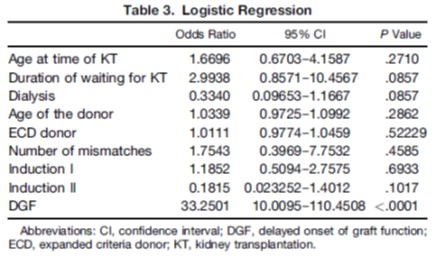FlowPRA Screening of antiHLA Antibodies in the Waiting List Significantly Reduces the Occurrence of Acute Rejection after Kidney Transplantation
Ivana Dedinska1, Juraj Miklušica1, Nadežda Mäčková2, Lea Kováčiková1, Ľudovít Laca1, Peter Galajda3, Marián Mokáň3.
1Surgery Clinic and Transplant Center, University Hospital Martin and Jessenius Faculty of Medicine Comenius University, Martin, Slovakia (Slovak Republic); 2Martin Immunological Center, Martin Immunological Center, Martin, Slovakia (Slovak Republic); 3Internal Clinic I , University Hospital Martin and Jessenius Faculty of Medicine Comenius University, Martin, Slovakia (Slovak Republic)
Introduction: Presence of the preformed human leukocyte antigen (HLA)–reactive antibodies in recipient serum before transplantation has long been recognized as a prominent risk factor for a generally worse graft outcome. Screening and identification of HLA antibodies can be used to stratify patients into high and low risk categories.
Material and Methods: This is a prospective analysis with determining the antiHLA antibodies by flowPRA (with adding the specification after positive screening – more than 5 %). According to the result of the screening test, the patient was allocated, according to the actual immunologic risk, the induction immunosuppressive protocol.
Results: In the group of 78 patients, we realised 2 times per year the screening of flowPRA of anti HLA antibodies. According to the immunologic risk, the patients were divided into 3 groups (low, medium, and high immunologic risk), and according to the risk, we applied the induction immunosuppressive protocol  . Stratification of the risk was correct, because predicter for development of acute rejection in the monitored period of 12 months was only the late onset of the function of the donor´s graft [odds ratio 33.2501; 95% CI 10.0095-110.4508 (P < 0.0001)]. The occurrence of acute rejection upon implementing the screening was reduced in our Transplant Center from 44 % to 19 % (P < 0.0001). No difference was recorded in the 12-month survival of grafts and patients according to the applied induction immunosuppressive protocol.
. Stratification of the risk was correct, because predicter for development of acute rejection in the monitored period of 12 months was only the late onset of the function of the donor´s graft [odds ratio 33.2501; 95% CI 10.0095-110.4508 (P < 0.0001)]. The occurrence of acute rejection upon implementing the screening was reduced in our Transplant Center from 44 % to 19 % (P < 0.0001). No difference was recorded in the 12-month survival of grafts and patients according to the applied induction immunosuppressive protocol.

Conclusion: We confirmed significantly reduced occurrence of acute rejection in the monitored period of 12 months in case of applying individualised induction according to flowPRA screening of antiHLA antibodies. FlowPRA represents a suitable alternative for screening and specification of antiHLA antibodies in case the Luminex methodology is unavailable.
